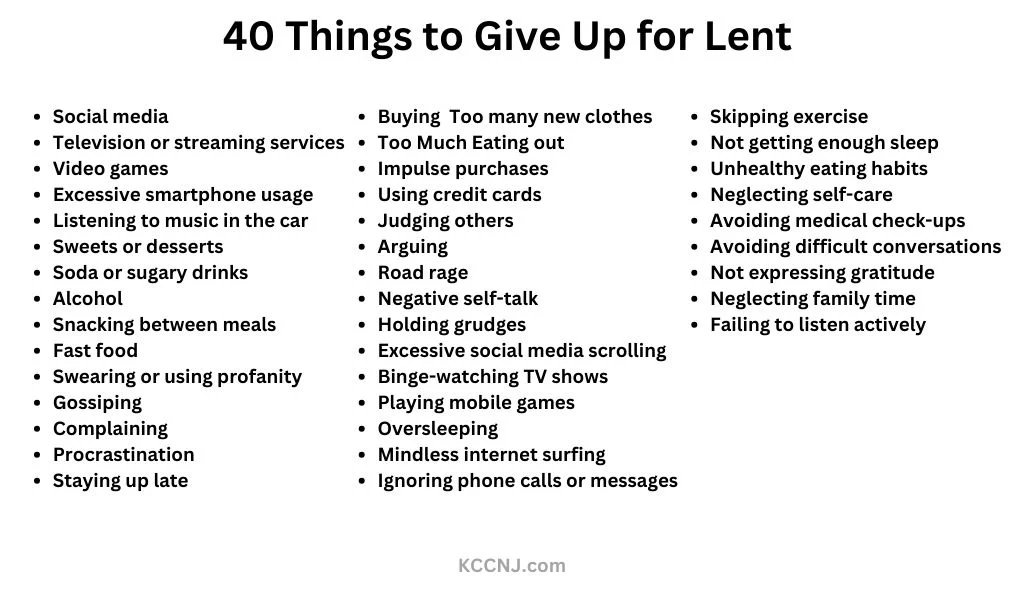40 Things to Give Up for Lent 2025:Practical Ideas
Lent, a 40-day period of reflection and sacrifice in the Christian calendar, offers an opportunity for spiritual growth and personal development. During this time, many choose to give up certain habits or indulgences as a form of discipline and devotion.
This guide presents 40 ideas for Lenten sacrifices, ranging from common choices to more unique options, each explained to help you understand its potential impact on your spiritual journey.
40 Ideas for Lenten Sacrifices
1. Technology and Media
- Social media: Reducing or eliminating social media use can free up time for more meaningful interactions and self-reflection.
- Television or streaming services: Cutting back on TV watching can create space for other activities that nurture your spiritual life.
- Video games: Taking a break from gaming can help redirect focus to more productive or spiritually enriching pursuits.
- Excessive smartphone usage: Limiting phone time can increase presence in daily life and reduce digital distractions.
- Listening to music in the car: Using drive time for silence or prayer can provide moments of peace and reflection in busy days.
2. Food and Drink
- Sweets or desserts: Giving up treats can help develop self-control and appreciation for simpler foods.
- Soda or sugary drinks: Abstaining from these beverages can improve health and increase mindfulness about consumption habits.
- Alcohol: Taking a break from alcohol can lead to better sleep, improved health, and clearer thinking.
- Snacking between meals: Limiting snacks can increase discipline and gratitude for regular meals.
- Fast food: Avoiding fast food can encourage healthier eating habits and more mindful food choices.
3. Personal Habits
- Swearing or using profanity: Eliminating harsh language can promote more thoughtful and positive communication.
- Gossiping: Refraining from gossip can improve relationships and foster a more compassionate outlook.
- Complaining: Reducing complaints can lead to a more positive attitude and increased gratitude.
- Procrastination: Tackling tasks promptly can reduce stress and increase productivity.
- Staying up late: Prioritizing sleep can improve overall health and daily functioning.
4. Consumption and Spending
- Online shopping: Limiting online purchases can reduce impulse buying and promote contentment with what you have.
- Buying new clothes: Taking a break from clothing purchases can increase appreciation for your existing wardrobe.
- Eating out: Cooking at home more often can save money and encourage healthier eating habits.
- Impulse purchases: Avoiding unplanned buys can improve financial health and reduce clutter.
- Using credit cards: Opting for cash or debit can increase awareness of spending habits and reduce debt.
5. Negative Behaviors
- Judging others: Suspending judgment can foster empathy and improve relationships.
- Arguing: Choosing peace over conflict can lead to more harmonious interactions.
- Road rage: Practicing patience while driving can reduce stress and increase safety.
- Negative self-talk: Replacing self-criticism with self-compassion can improve mental health and self-esteem.
- Holding grudges: Letting go of resentments can free up emotional energy and promote healing.
6. Time-Wasting Activities
- Excessive social media scrolling: Limiting aimless browsing can reclaim time for more meaningful activities.
- Binge-watching TV shows: Moderating TV consumption can create space for other pursuits and improve sleep habits.
- Playing mobile games: Reducing game time can increase productivity and engagement with the real world.
- Oversleeping: Waking up on time can lead to more productive days and better sleep patterns.
- Mindless internet surfing: Limiting unfocused browsing can improve concentration and time management.
7. Physical and Mental Health
- Skipping exercise: Committing to regular physical activity can improve overall health and mood.
- Not getting enough sleep: Prioritizing sleep can enhance cognitive function and emotional well-being.
- Unhealthy eating habits: Focusing on nutrition can improve physical health and energy levels.
- Neglecting self-care: Prioritizing self-care can reduce stress and improve overall well-being.
- Avoiding medical check-ups: Addressing health concerns promptly can prevent more serious issues.
8. Relationships and Communication
- Ignoring phone calls or messages: Responding promptly can improve relationships and reduce anxiety.
- Avoiding difficult conversations: Addressing issues directly can lead to healthier relationships and personal growth.
- Not expressing gratitude: Regularly showing appreciation can enhance relationships and personal happiness.
- Neglecting family time: Prioritizing family can strengthen bonds and create lasting memories.
- Failing to listen actively: Improving listening skills can deepen connections and understanding.

Understanding Lent and Its Significance
Lent is a season of preparation leading up to Easter, typically observed by Christians worldwide. It begins on Ash Wednesday and ends on Holy Thursday, lasting for 40 days (excluding Sundays). The number 40 holds biblical significance, mirroring Jesus’ 40 days of fasting in the desert.
The Purpose of Lenten Sacrifice
The practice of giving something up for Lent serves several purposes:
- Self-discipline: By voluntarily abstaining from something we enjoy, we develop self-control and willpower.
- Spiritual growth: Creating space in our lives by removing distractions allows for deeper reflection and prayer.
- Empathy: Experiencing sacrifice can foster understanding for those who have less.
- Gratitude: Temporarily giving up certain comforts helps us appreciate what we have more fully.
Choosing the Right Sacrifice for You
When selecting what to give up for Lent, consider these factors:
- Personal significance: Choose something meaningful to you for greater impact.
- Feasibility: Ensure your choice is realistic given your lifestyle and commitments.
- Spiritual growth: Opt for a sacrifice that will contribute to your spiritual journey.
- Impact on others: Consider how your choice might affect those around you.
Questions to Ask Yourself
- What habits or behaviors do I want to change?
- What distracts me from my spiritual life?
- What would be genuinely challenging for me to give up?
- How can my sacrifice benefit others?
Implementing Your Lenten Sacrifice
Once you’ve chosen what to give up, follow these steps to stay committed:
- Set clear intentions: Define why you’re making this sacrifice and what you hope to gain.
- Create a plan: Outline how you’ll navigate challenges and temptations.
- Find accountability: Share your commitment with a friend or family member who can support you.
- Track your progress: Keep a journal or use an app to monitor your journey.
- Reflect regularly: Take time each day to consider the impact of your sacrifice.
Alternative Approaches to Lenten Sacrifice
While giving something up is traditional, there are other ways to observe Lent:
Adding Positive Habits
Instead of (or in addition to) giving something up, consider adopting new positive habits:
- Daily prayer or meditation: Cultivate a regular spiritual practice.
- Reading scripture or spiritual texts: Deepen your understanding of your faith.
- Volunteering or community service: Give back to your community.
- Acts of kindness: Intentionally spread positivity to others.
- Journaling or self-reflection: Increase self-awareness and personal growth.
Combining Sacrifice with Action
Pair your sacrifice with a corresponding positive action:
- If giving up social media, use that time for face-to-face connections.
- If abstaining from sweets, donate the money saved to a food bank.
- If cutting back on TV, spend that time learning a new skill or hobby.
Overcoming Challenges During Lent
Staying committed to your Lenten sacrifice can be difficult. Here are some strategies to help you persevere:
- Remember your motivation: Reflect on why you chose this sacrifice.
- Take it one day at a time: Focus on the present rather than the entire 40-day period.
- Find substitutes: Replace the habit you’re giving up with a positive alternative.
- Seek support: Connect with others who are also observing Lent.
- Be gentle with yourself: If you slip up, don’t give up entirely. Recommit and continue.
The Impact of Lenten Sacrifices Beyond the Season
The benefits of Lenten sacrifices often extend beyond the 40-day period:
- Habit formation: Many people continue their new habits after Lent ends.
- Increased awareness: The experience can lead to lasting changes in behavior and priorities.
- Spiritual growth: The practice of sacrifice can deepen one’s faith and relationship with God.
- Personal development: Overcoming challenges during Lent can boost self-confidence and discipline.
Lent for Non-Religious Individuals
While Lent is primarily a Christian observance, its principles can be valuable for anyone seeking personal growth:
- Self-improvement: Use the 40 days as a period of focused self-development.
- Mindfulness: Practice being more present and intentional in daily life.
- Gratitude: Cultivate appreciation for what you have by temporarily giving up certain luxuries.
- Community: Participate in group challenges or initiatives for mutual support and motivation.
Preparing for the End of Lent
As Easter approaches, consider how to conclude your Lenten journey:
- Reflect on your experience: What did you learn? How did you grow?
- Decide what to continue: Which new habits or insights do you want to maintain?
- Celebrate mindfully: Plan how to reintroduce what you gave up without reverting to old patterns.
- Express gratitude: Thank those who supported you during this time.

Frequently Asked Questions
When does Lent start and end in 2025?
Lent in 2025 begins on Ash Wednesday, March 5, and ends on Holy Thursday, April 17.
Can I break my Lenten sacrifice on Sundays?
Traditionally, Sundays during Lent are not counted as part of the 40 days, so some people choose to relax their sacrifice on these days. However, this is a personal choice.
What if I accidentally break my Lenten promise?
If you slip up, simply recommit to your sacrifice. The purpose of Lent is growth, not perfection.
Is it necessary to give up something for Lent?
While giving something up is a common practice, it’s not mandatory. The important thing is to use this time for spiritual reflection and growth.
Can children participate in Lenten sacrifices?
Yes, children can participate in age-appropriate ways. It’s an opportunity to teach them about self-discipline and spiritual practices.







